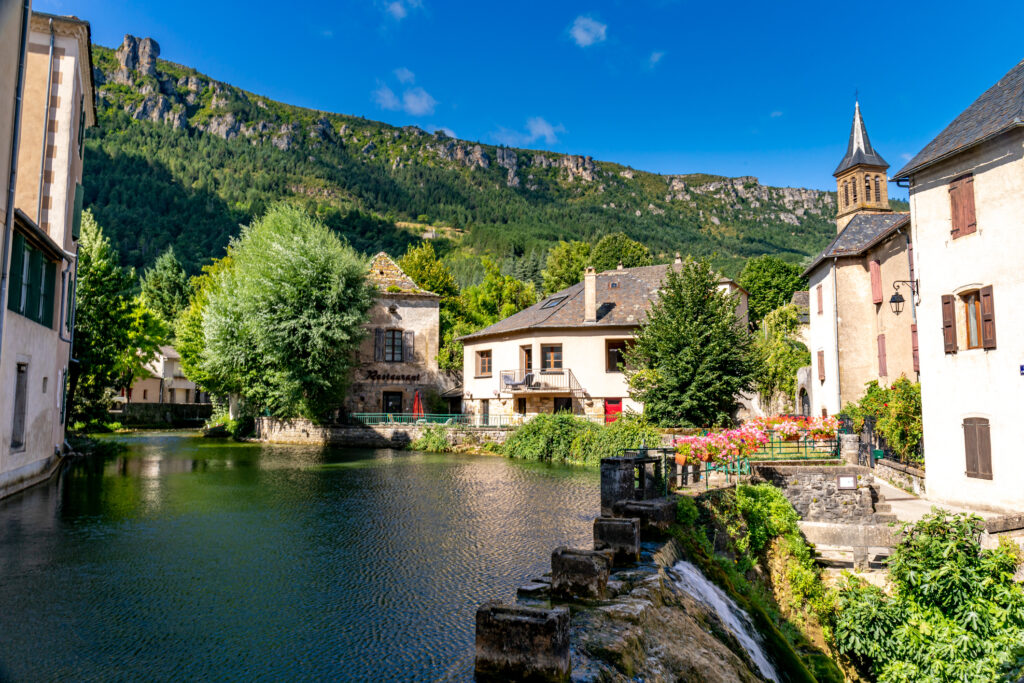Memories of Verrieres
by Ruth Spencer
Verrieres, a village between Poitiers and Limoges, came up recently during a conversation. Just mentioning the name brought back some memories and I decided to look it up on the Google map on my computer. Using the satellite view, I set out to find the house in which I lived from 1943 to 1945. It was still there, hardly changed.
After the German invasion in 1940, Verrieres was in the “Unoccupied Zone” of France. I moved there with the Bachmanns, Tante Paula and Uncle Sigi, with whom I had lived on-and-off after my mother, in February 1939, put me on a train from Saarbruecken, Germany, to Sarreguemines, France. Later I continued to live with these distant relatives in Blois, Poitiers and Cazeres. It was on account of Uncle Sigi, who could not bear the hot southern climate of Cazeres, that the decision to move further North was made. Also the Salomon family, long time friends of the Bachmanns, already lived in Verrieres. They were instrumental in finding a place for us to live.
It was a small house built above a garage that led, in the back, to a large vegetable garden. At the bottom of the garden was a brook next to a big shed – all still there today – used for storage as well as for washing laundry in a big vat set on a stove. At the front of the house a short flight of outdoor steps gave access to two rooms, one behind the other. The front room, with a stove, a large sink and a big table was the kitchen living room. The back room, with two beds, was Tante Paula and Uncle Sigi’s bedroom. From the kitchen living room a narrow staircase led to the attic furnished with a bed and a chair. This became my domaine. There was no bathroom nor running water in the house. A small toilet was in the garage below. Water had to be fetched from the public water pump at the corner of the square across the street and fetching water with buckets was my job.
Sometime after we had moved to Verrieres Meta and Alfred Horwitz, friends of the Bachmanns, came to live with us. They shared the other half of the attic with me. They were a wonderful loving couple. I could have real conversations and felt understood which was never the case with the Bachmanns. I believe they had family in the United States and one day, several months later, they moved out. I do not know why they left nor where they went and have never heard from them again. I never forgot them and sometimes wonder whether they have survived.
My mind kept wandering back to some other events that took place in and around Verrieres. I was 14 years old then and had outgrown the local school. The books for a correspondence course could not be obtained. Catholic nuns from the local convent came to see us offering some teaching and the possibility to convert me. I and everybody else in the household declined.
Although Verrieres was in the unoccupied zone, the Petain Regime in Vichy had long been overruled by the German Authorities and German army convoys showed up every now and then in towns and villages. Invariably they would announce, through loudspeakers mounted on trucks, for all local Jewish men to gather in the main square with an overnight bag. Later on whole families were required to show up, never to be seen again. Verrieres, with maquis fighters holed up in nearby forests, was no exception and we needed a hiding place to keep safe and escape from possible deportation. The shed at the other end of the garden was the answer. We organized it for several days of survival in case it may be needed. And indeed the time came when German troops set up camp in the village square. All five of us barricaded ourselves in the shed for three days. We slept on mattresses on the floor, ate cold food, rationed the water we had, whispered and avoided making noise of any kind. The second night it rained heavily and, unfortunately, the roof was leaking in various places. We placed buckets around and opened a few umbrellas we had brought along and slept under them. It was hilarious, comical and we couldn’t help laughing silently to ourselves.
Of course I also thought of the day Uncle Sigi attempted to kiss me. It was sometime after my 15th birthday; the Horwitzes no longer lived with us and Tante Paula was not home. I had just come in from outside when Uncle Sigi, a rather heavy set man walking with a cane, stepped in front of me and tried to grab me. I was able to push him back with both my hands and all my strength, sending him against the kitchen table. I promised him in no uncertain terms that, should he ever try this again, I would tell Tante Paula. He never tried again. Today I wonder how many children had been exposed to similar or worse situations yet never dared to mention it.
While living in Verrieres I did enjoy bicycling through the countryside, along narrow country lanes cutting through fields of wheat. The black market was flourishing everywhere and farmers were making money as they never had before. We befriended one family in particular and every now and then I drove out to their farm. They always welcomed me warmly and I came home loaded with bags filled with butter, milk, chicken and eggs. One day they told me proudly that they had decided to build a “WC” in the garden “but it will only be used on Sundays.…”








